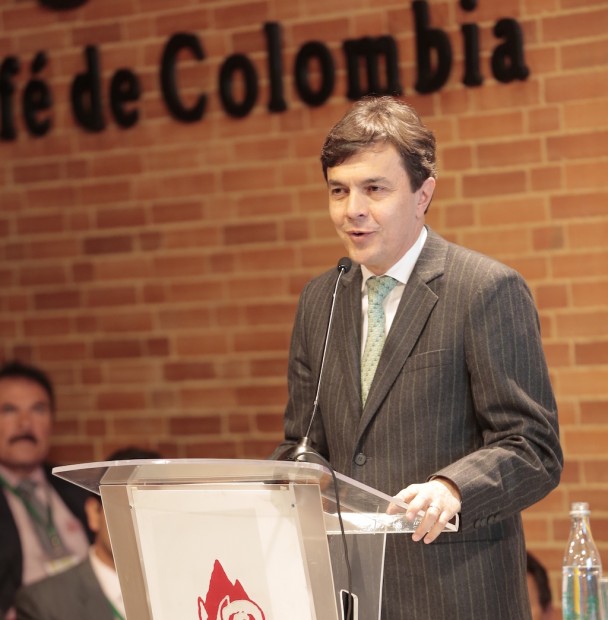Colombian coffee leaders shared initial plans 10 days ago for a global accord with a focus on profitability of coffee farmers to ensure the economic sustainability of the commodity coffee sector at large.
The proposal for a multinational agreement — details of which have not yet been publicly put forth — was presented by the Colombian Coffee Growers Federation (FNC) at the recent International Coffee Week (Sintercafe) event in Costa Rica. FNC CEO Roberto Vélez Vallejo spoke to coffee producer representatives from Mexico, Honduras, Guatemala, Peru and Colombia, as well as industry representatives from North America, Europe and Asia.
“What we seek with this proposal is to achieve an agreement with the entire industry that translates into price levels that make coffee growing a profitable and economically sustainable activity for coffee growers as it does for the industry,” Vélez Vallejo said. “With current prices, we can hardly expect coffee growing to survive. We seek that the industry recognizes that coffee growers make great efforts to achieve quality and sustainability. Viability of the entire chain, starting by the farm, is a co-responsibility of all the links.”
The FNC plans to further outline the agreement at the International Coffee Organization‘s World Coffee Conference in March in Ethiopia. ICO member countries account for a vast majority of the world’s coffee production and approximately three quarters of the world’s coffee consumption.
The proposal comes at a time when coffee commodity prices have generally trended downward over the past two years, and have been characterized by volatility in the free market since the quota system set by the International Coffee Agreement, which is administered by the ICO, was dissolved in 1989. Coffee supply sustainability is naturally one of the biggest issues effecting the global industry at large, impeded by any number of economic and environmental challenges faced by smallholder farmers around the world.
Vélez Vallejo, who was elected to the FNC’s top leadership post earlier this year, hinted at the group’s involvement in a “more comprehensive sustainability concept, in which growers’ interests are seriously taken into account” in a Q&A with Daily Coffee News earlier this year.
We’ll have more as the proposal develops.
Here as an announcement of the initial proposal in full from the FNC in Spanish:
Colombia, mayor productor de café arábico suave lavado, retomó su liderazgo en la vocería de los temas clave del sector y así lo demostró durante la Semana Internacional del Café (Sintercafé) en Costa Rica, donde propuso hacer un acuerdo de sostenibilidad económica con la industria mundial, que tome en cuenta como pieza primordial la rentabilidad del caficultor.
Esta propuesta–que tuvo muy buena acogida entre los participantes- fue presentada por el Gerente General de la Federación Nacional de Cafeteros (FNC), Roberto Vélez Vallejo, durante este importante encuentro al que asistieron representantes de México, Honduras, Guatemala, Perú y Colombia, así como de la industria cafetera de Norteamérica, Europa y Asia.
“Lo que buscamos con esta propuesta es lograr un acuerdo con toda la industria que se concrete en unos niveles de precio que hagan de la actividad cafetera un actividad rentable y sostenible económicamente para el caficultor así como lo es para la industria”, dijo Vélez Vallejo.
Ahora y con el fin de consolidar esta propuesta, Colombia la presentará en el marco de la Conferencia Mundial del Café, evento que realizará la Organización Internacional del Café (OIC) en marzo en Etiopía y al que asisten países que representan 94% de la producción mundial y más del 75% del consumo mundial de café.
“Es nuestro deber proteger el medio ambiente y a las comunidades en su conjunto; pero si la actividad de cada caficultor no es rentable, no quedará medio ambiente ni comunidades cafeteras para cuidar en el futuro pues la caficultura desaparecerá” agregó el Gerente General de la Federación de Cafeteros.
De ser acogida esta medida, beneficiaría directamente a más de 22 millones de personas que trabajan en el proceso productivo del grano a nivel mundial (2,3 millones en Centroamérica, 2,2 en Suramérica, 12,1 en África y 5,5 millones en Asia).
“Con los precios de hoy, difícilmente se puede esperar que la caficultura sobreviva. Estamos apuntando a que la industria reconozca que el caficultor hace un gran esfuerzo con miras a la calidad y la sostenibilidad, que debe ser reconocida. La viabilidad de toda la cadena, empezando en la finca, es corresponsabilidad de todos los eslabones de la misma”, concluyó el dirigente gremial.
En Colombia, 500 mil familias se dedican al cultivo del café. Y aunque la extensiva renovación de cafetales ha elevado la productividad general y cada vez más familias han apostado por la producción de cafés especiales, que las ayudan a blindarse de la volatilidad del precio internacional y de factores externos como la tasa de cambio, un número importante de familias se sigue viendo afectado por los altibajos del precio internacional.
Nick Brown
Nick Brown is the editor of Daily Coffee News by Roast Magazine.
Comment
1 Comment
Comments are closed.







Great move by Mr. Véllez Vallejo to protect the interest of the smallest farming families. Until the market begins to put its collective efforts towards supporting smallholder coffee farmers only bigger plantations will be able to survive a sustained drop in prices. Some of the best quality and potential quality comes from smallholder farms with 2-5 hectacres, the industry should continue making strides to establish direct trade relationships with these farmers, otherwise the offspring of today´s coffee farmers will continue to look to the capital cities where they have the promise of higher pay rather than continue the family tradition.